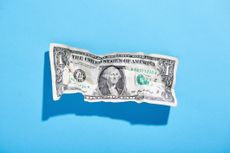Roth IRAs: What They Are and How They Work
A Roth IRA is an individual retirement account that allows tax-free investment growth and distributions, as long as key rules are followed.


A Roth IRA is a type of individual retirement account that allows workers to save money for retirement using after-tax dollars. This means taxes are paid on the contributions before they are placed in the account. As a result, the money is allowed to grow tax-free over time so that it can be withdrawn later on a tax-free basis.
Essentially, a Roth IRA is the opposite of a traditional IRA in terms of its tax treatment. Taxes are paid before contributions are made to a Roth, but they're paid on a traditional IRA at the time the money is withdrawn. Other than this difference in tax treatment, they are similar in many ways.
How are Roth IRAs funded?
A Roth IRA can be funded from a wide variety of different sources, including regular contributions from the account owner, spousal IRA contributions, rollovers, conversions and transfers. A Roth also allows for the contributed funds to be placed in a wide variety of investments.

Sign up for Kiplinger’s Free E-Newsletters
Profit and prosper with the best of expert advice on investing, taxes, retirement, personal finance and more - straight to your e-mail.
Profit and prosper with the best of expert advice - straight to your e-mail.
Regular Roth contributions must be made in the form of cash rather than securities or other assets. However, not every income source can be used to fund a Roth. For example, some excluded sources include rental and interest income, dividends and capital gains on stocks, and income from pensions or annuities.
Roth IRA investment options
Like other retirement accounts, the money placed into a Roth grows over time tax-free, but a Roth offers a wider array of investment options for the contributed funds. Additionally, the owner can keep and contribute to their Roth indefinitely because there are no required minimum distributions like there are with traditional IRAs and 401(k)s.
Among the investments allowed in a Roth IRA are stocks and bonds, exchange-traded funds, mutual funds, money market funds, certificates of deposit and cryptocurrency. A self-directed Roth IRA offers access to the largest number of investment options compared to other types of Roths, although not every firm that offers IRAs may offer self-directed Roth IRAs.
With a self-directed Roth, the investor rather than the financial institution that manages the account chooses how the funds will be invested. Additional investment options include gold, real estate, partnerships and even a franchise business. However, not all financial institutions offer every investment option, so investors may want to keep that in mind when selecting a firm to manage their Roth.
Withdrawal rules and penalties
Money contributed to a Roth can be withdrawn at any time without any penalty. However, there can be a 10% early withdrawal penalty and sometimes taxes for withdrawing the earnings on those contributions before the age of 59½, depending on how long the money has been in the account.
For withdrawals of the earnings made on contributions to be considered qualified distributions, they must occur at least five years after the account was established and funded. Additionally, one of these conditions must also be met: the Roth holder must be at least age 59½ or disabled, the distribution must be used to buy or build a first home for the holder or a qualified family member, or the money is being distributed to the holder's beneficiary upon their death.
For unqualified distributions, a penalty can be avoided if the money is used for medical expenses or insurance, childbirth or adoption, or qualified higher education expenses.
Roth contribution limits
There is a limit on how much can be contributed to a Roth every year, although the IRS adjusts this amount higher gradually over time. For 2024, the maximum someone can contribute to a Roth IRA is $7,000 in a year, although you can't contribute more than your earned income in any tax year. However, this total is shared across all IRAs, including traditional IRAs. Those who are age 50 or older can also make catch-up contributions, meaning they're allowed to contribute up to $8,000 total to all their IRAs.
Additionally, not everyone is eligible to contribute to a Roth. Investors must have earned income in the tax year in which they want to contribute and will become ineligible to contribute if their income rises above a certain amount.
In 2024, individual investors must earn less than $146,000 to contribute the full amount to a Roth and less than $161,000 to be eligible to contribute part of it. For married taxpayers filing jointly and living with their spouse, these numbers rise to $230,000 for the full amount and $240,000 for a partial contribution.
Most financial institutions also have their own set of requirements for Roths, like varying minimum required balances. Some firms might charge an inactivity fee on accounts that are left alone for too long.
Finally, investors are always advised to do their due diligence when selecting a financial institution to manage their Roth or other retirement accounts.
Related articles

To continue reading this article
please register for free
This is different from signing in to your print subscription
Why am I seeing this? Find out more here
Get Kiplinger Today newsletter — free
Profit and prosper with the best of Kiplinger's advice on investing, taxes, retirement, personal finance and much more. Delivered daily. Enter your email in the box and click Sign Me Up.
Jacob is the founder and CEO of ValueWalk. What started as a hobby 10 years ago turned into a well-known financial media empire focusing in particular on simplifying the opaque world of the hedge fund world. Before doing ValueWalk full time, Jacob worked as an equity analyst specializing in mid and small-cap stocks. Jacob also worked in business development for hedge funds. He lives with his wife and five children in New Jersey. Full Disclosure: Jacob only invests in broad-based ETFs and mutual funds to avoid any conflict of interest.
-
 Lost Your Way Financially? How to Get Back on Track
Lost Your Way Financially? How to Get Back on TrackMaking even small adjustments to spending and saving habits can make a big difference when it comes to meeting your financial goals.
By Vanessa Okwuraiwe Published
-
 The Taxes That Come out of Your Paycheck
The Taxes That Come out of Your PaycheckPayroll Tax Your take-home pay is often less than expected due to several payroll tax withholdings you need to know.
By Kelley R. Taylor Last updated